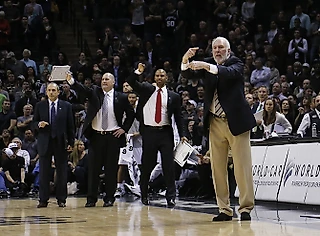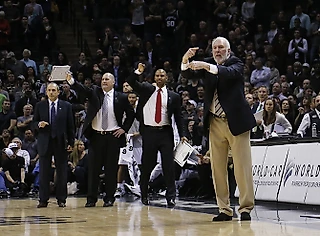Living under pressure
Messina Online
Many people - friends, colleagues, opponents and journalists – ask me how difficult is to work under pressure of expectations. Actually, I was lucky to coach very good teams in my career. If you’re coaching a good team, you have more opportunities to win and this helps you to cope with expectations. However, good results create even higher expectations. It’s something that never ends.
I’m in a very lucky position. I do something I really like. Loving what you do is important. I probably would do it, even if I didn’t get paid for it. I’m surrounded by nice people who feel the same way. We are part of a great organization that provides us with everything necessary to achieve our goals.
It’s much harder to manage expectations and setbacks for the people who have jobs they don’t like and you have to go through a routine that is difficult to accept.
Being able to stay under pressure is a part of my job. It could be either small or big part, depending whether you let it overwhelm you. I admit this becomes a problem for me both on and off the court.
The expectations come from the fans who make sacrifices buying tickets or traveling with the team. Especially, if they are young and use their savings to buy tickets. We feel our responsibility and we work to make them happy every time. In basketball, you don’t play for yourself. You play for the people who like you, who stay with you. For your fans and relatives. There are also expectations of the club, expectations of the press and your own expectations to stay on the level you’ve been keeping for the last 10 years.
Our job is to play with desire, with the sense of togetherness. We should bring joy to people who come to our game or see basketball on TV. We shouldn’t disappoint our fans. They want to see athletes doing their best and playing with passion every time. They don’t want to see athletes arguing after a mistake. We must show our passion, because it’s not a robot game.
To tell you the truth, I have no special secret to cope with expectations. One thing that helps me is that I put much more pressure on myself than anyone else does. I put pressure to do my job the best possible way. This way I feel I’m trying to respect myself and all the people who work with me.
Honestly, this is also a bad part of my character. If, for some reason, I think that I’m not doing my job the right or the best possible way, I get nervous. It’s difficult to stay close to me at these moments. Even for my wife. I close myself off. I stop speaking with people. That is something I’m trying to correct over the years.
I can get upset if I feel that we treat preparation for some game as a formality. We take for granted that we’re going to do something well and it turns out we’re not doing it the right way during the game. It happens very rarely, though.
I try to be realistic. Even with such an excellent team as CSKA, you cannot win all games. If we don’t do something the right way, we can lose to our opponents. Therefore we’re trying to put on ourselves the pressure to perform the right way every game.
My favorite comparison here is with people who play music or dance. Ballet practices are really exhausting. Repetition, repetition, repetition. I really admire them, because they need to have an incredible mental toughness to perform delicate and gracious movements under such pressure. They have to deal with their own expectations, those of their teachers and the audience.
I try to accept the loss of a game, if I put my best effort to prepare for it. I can try to accept criticism as well. This sometimes can be difficult especially when I feel that commentators are focusing mainly on what went wrong forgetting what was good even in the defeat.
The ability to stay under the pressure of expectations highly depends on your attitude towards yourself. Right attitude is to push yourself to do things the best possible way. The opposite is to feel sorry for yourself and find excuses for everything. “I didn’t do that, because I felt tired… we lost because of the referees… I didn’t wake up at 7:30 to take my son to school, because my wife can do it…” Rationalizing is easy.
If you try that attitude it’ll help you to be more responsible of yourself and to accept more pressure that come with it. I strongly believe that you have more responsibility, if you’re good at something. If you’re not so good, nobody expects you to do well.
Another important thing is how we handle setbacks and defeats. When we lose a game or we don’t achieve the result we were after, most of us (and myself first!) have a tendency to focus on the bad part and forget all good things about preparation. It looks like the world is over after that loss. It’s a big mistake to perceive defeats this way. It’s harmful to ourselves, to our teammates, to our organization and to fans. On the contrary, we should remember that we’ve done a lot. It will give us credibility and confidence that we can try again and do it. If we become too negative, we lose this confidence. I’m not very good at it and I trying to became better, trying to follow more the opinions of the people that work with me and that are usually more positive in tough moments.
A friend of mine taught me that attention and ability to concentrate are limited resources. Therefore I try not to overload myself with too many things during the season. If you try to concentrate on many things at a time, you run out of your attention. That’s one of the most important things to remember. However, switching from basketball to something else could be extremely useful. It might help you relieve the bad habit of staying all day thinking about basketball. Basketball is a great part of our life but it could not be the only one.




